 Your new post is loading...
 Your new post is loading...
Exotrail défie la gravité et s'affirme comme un leader français et européen du #NewSpace
How Fireflies.ai works? Users can connect their Google or Outlook calendars with Fireflies and have our AI system capture meetings in real-time across more than a dozen different web-conferencing platforms like Zoom, Google Meet, Skype, GoToMeeting, Webex, and many more systems. These meetings are then indexed, transcribed, and made searchable inside the Fireflies dashboard. You can comment, annotate key moments, and automatically extract relevant information around numerous topics like the next steps, questions, and red flags. Instead of spending time frantically taking notes in meetings, Fireflies users take comfort knowing that shortly after a meeting they are provided with a transcript of the conversation and an easy way to collaborate on the project going forward. Fireflies can also sync all this vital information back into the places where you already work thanks to robust integrations with Slack, Salesforce, Hubspot, and other platforms. Fireflies.ai is the bridge that helps data flow seamlessly from your communication systems to your system of records. This approach is possible today because of major technological changes over the last 5 years in the field of machine learning. Fireflies leverage recent enhancements in Automatic Speech Recognition (ASR), natural language processing (NLP), and neural nets to create a seamless way for users to record, annotate, search, and share important moments from their meetings. Who is Fireflies for? The beauty of Fireflies is that it’s been adopted by people in different roles across organizations big and small: - Sales managers use Fireflies to review their reps’ calls at lightning speed and provide on the spot coaching
- Marketers create key customer soundbites from calls to use in their campaigns.
- Recruiters no longer worry about taking hasty notes and instead spend more time paying attention to candidates during interviews.
- Engineers refer back to specific parts of calls using our smart search capabilities to make everyone aware of the decisions that were finalized.
- Product managers and executives rely on Fireflies to document knowledge and important initiatives that are discussed during all-hands and product planning meetings on how to get access Fireflies have a free tier for individuals and teams to easily get started. For more advanced capabilities like augmented call search, more storage, and admin controls, we offer different tiers for growing teams and enterprises. You can learn more about our pricing and tiers by going to fireflies.ai/pricing.
SiFive, a San Francisco, CA-based provider of commercial RISC-V processor IP, raised $50.6m in Series C funding. The round, which brings total funding to $64.1m, was led by existing investors Sutter Hill Ventures, Spark Capital and Osage University Partners alongside new investor Chengwei Capital, and strategic investors including Huami, SK Telecom and Western Digital and other companies. Led by Naveed Sherwani, CEO, SiFive provides processor core IP based on the RISC-V instruction set architecture. The company intends to use the funds to bring its technologies to the marketplace.
Silicon Valley giant Apple Inc. on Wednesday confirmed that it is investing $1 billion (approximately Rs 6,793 crore) in Japanese telecom major SoftBank Group’s Vision Fund, an estimated $100-billion (approximately Rs 68 lakh crore) venture that will oversee the development of new technologies. Taiwanese electronics manufacturer Foxconn and the family of the Oracle corporation’s chairman Larry Ellison are also expected to invest in the fund, the Wall Street Journal reported. Apple believes the move “will help ‘speed the development of technologies that may be strategically important” to it, company spokesperson Kristin Huguet said. Apple has rarely ever invested in venture capital companies before. While SoftBank will itself invest approximately $25 billion (approximately Rs 17 lakh crore) in its Vision Fund, it will be back largely by the Saudi Arabian government. American telecom equipment company Qualcomm Inc is also expected to put in an investment. The SoftBank Vision Fund is expected to close its fundraising efforts by mid-2017.
Streamroot harnesses the latest web technologies (HTML5 and WebRTC) and powerful proprietary algorithms to offer state-of-the-art P2P streaming.
Streamroot improves on traditional unicast video delivery by decentralizing exchanges and providing content via multiple sources.
With Streamroot, viewers begin loading video content directly from your server. At the same time, they connect to the Streamroot tracker, retrieve an intelligently selected list of peers, and establish a direct connection with them to exchange video segments.
Segments come from the source that provides them most quickly, improving exchanges, heightening reliability and better managing traffic.
Magic Leap raised $794 million in new funding and CEO Rony Abovitz posted a blog suggesting the secretive company is moving closer toward a product, writing “we are setting up supply chain operations, manufacturing.” Chinese e-commerce company Alibaba led the round and Joe Tsai, Alibaba’s Executive Vice Chairman, is getting a seat on the board. The announcement roughly confirms a December report suggesting the company was raising money in this ballpark. The Series C round puts the Florida startup’s funding to date close to $1.4 billion. Magic Leap also seems to have named its technology “Mixed Reality Lightfield” with subtle language in the blog post linked above that might be commentary about current VR technology, which isn’t able to perfectly reproduce what your eyes see in the real world. “It comes to life by following the rules of the eye and the brain, by being gentle, and by working with us, not against us,” Abovitz wrote about the company’s technology. “By following as closely as possible the rules of nature and biology.” Abovitz previously suggested Rift-like VR headsets have a history of “issues that near-eye stereoscopic 3d may cause” and that “we have done an internal hazard and risk analysis….on the spectrum of hazards that may occur to a wide array of users.”
Email has long been the scourge of many office places, with inboxes often resembling warzones of unread messages, stars and tags, missing attachments, and all around chaos around next steps for each item. These problems are only exacerbated when multiple people are included on an email chain. Front is a shared inbox and collaboration platform for enterprise email that looks to solve many of these problems. Today, the Summer 2014 Y Combinator grad announced $3.1 million in Seed funding in a round led by SoftTech VC, with participation from BOLDStart, Point Nine Capital and Caffeinated Capital. The formerly Parisian company is now permanently headquartered in the Bay Area. “Email is great, but it was invented for one-to-one communication,” says Front co-founder and CEO Mathilde Collin. “Unfortunately, email is regularly used for one-to-many, and many-to-one communication. We wanted to make email useful again for companies.”
Over the past few years the semiconductor funding ecosystem experienced a downturn. According to the GSA survey, there were only five Series A semiconductor funding rounds and 10 exits in 2010 in North America, Europe and Israel. Most of the VCs who invested in semiconductors shifted their focus to software startups due to higher scalability, faster time-to-exit and low cost of failure. However, I believe semiconductor funding hit bottom in 2013, and it is slowly coming back. I analyzed publicly available transaction data from CrunchBase and discovered promising insights about recent funding trends.
Apsalar, a leading mobile advertising and analytics company, today announced that it has closed a $9 million Series B round of financing. The round was led by DCM, with participation from Correlation Ventures and existing investors, including Thomvest Ventures and DN Capital.Apsalar’s data-powered mobile advertising product, a mobile Demand-Side Platform (DSP), helps mobile app marketers and agencies buy high-ROI mobile ads for their apps across over 70 networks and real-time bidding (RTB) exchanges, using one centralized platform. The company taps into the power of behavioral targeting, using its anonymized first-party data on over 800 Million mobile app users to help advertisers more effectively acquire and retarget profitable and engaged users.
Accel Partners, which has invested in Cloudera, Fusion-io and RelateIQ, is making a further big push into big data, as it announces the creation of a second fund focused on startups that are storing, analyzing and harnessing the power of data analytics. The funding for the $100 million Big Data Fund 2 will come from Accel’s other investment vehicles worldwide, including Accel London IV, a new $475 million European and Israeli tech-focused fund that was announced in April.
The so-called Series A crunch isn't the problem.
Ce tour de table doit permettre d'alimenter l'impressionnante croissance du groupe. Créée en 2005, la start-up a généré un chiffre d'affaires de 9 millions de dollars en 2009, puis de 60 millions en 2010, et de 200 millions l'année dernière. Et le rythme devrait se poursuivre cette année, avec en plus un plan de recrutement de 250 salariés, qui permettra d'étoffer une structure aujourd'hui composée de 700 salariés. La raison de ce succès : une solution de « publicité display à la performance ». La société propose ainsi aux annonceurs des espaces publicitaires personnalisés en fonction des habitudes de navigation de l'internaute qu'elle recueille de façon anonyme et qu'elle exploite via un algorithme développé spécialement. Une solution qui lui permet de revendiquer un taux de clic dix fois supérieur au marché, aux alentours de 0,6 %. De quoi lui permettre d'envisager l'avenir avec sérénité, et notamment une introduction en Bourse. « On se met en ordre de bataille», commente sobrement Jean-Baptiste Rudelle.
|
Autonomous aviation startup Xwing raises $10M to scale its software for pilotless flights (via TechCrunch)
Quoting TechCrunch (impossible to scoop link) https://techcrunch.com/2020/05/20/autonomous-aviation-startup-xwing-raises-10m-to-scale-its-software-for-pilotless-flights/ "Autonomous aviation startup Xwing locked in a $10 million funding round before COVID-19 hit. Now the San Francisco-based startup is using the capital to hire talent and scale the development of its software stack as it aims for commercial operations later this year — pending FAA approvals. The company announced Wednesday its Series A funding round, which was led by R7 Partners, with participation from early-stage VC Alven, Eniac Ventures and Thales Corporate Ventures. Xwing has already hired several key executives with that fresh injection of capital, including Terrafugia’s former co-founder and COO Anna Dietrich, and Ed Lim, a Lockheed Martin and Aurora Flight Sciences veteran who more recently led guidance navigation and control for Uber’s autonomous car division as well as Zipline’s AV delivery drone. Xwing is different from some of the other autonomous aviation startups that have popped up in recent years. The startup isn’t building autonomous helicopters and planes. Instead, it’s focused on the software stack that will enable pilotless flight of small passenger aircraft. Xwing is also aircraft agnostic. The company’s engineers are focused on the key functions of autonomous flight, such as sensing, reasoning and control. The software stack, which is designed to work across different kinds of aircraft, is integrated into existing aerospace systems. That strategy of retrofitting existing aircraft will speed up deployment, while maintaining safety and keeping costs in check, according to founder and CEO Marc Piette. It also is a straighter path toward regulatory approval. “It’s more effective for us to not constrain ourselves to a given vehicle and to develop technology that is considered more of an enabler— from a marketing perspective — than going full stack, Piette said when asked if Xwing would ever try to build an autonomous aircraft from the ground up. Since Xwing’s last funding round — $4 million in summer 2018 — the company has been developing its tech and working with the FAA to receive flight certification for pilotless aircraft. Once approved, the company will seek to commercialize pilotless flights. The startup hasn’t named any commercial partners yet. And Piette hasn’t provided details about its commercial strategy either, although he said to expect more announcements this year. Xwing is already working with Bell for NASA’s Unmanned Aircraft Systems (UAS in the NAS) program, an initiative meant to mature the key remaining technologies that are needed to integrate unmanned aircraft in U.S. airspace. The program plans to hold demonstration flights this summer."
Japan’s SoftBank has radically scaled back plans for fresh investment in WeWork, the loss-making, shared-office provider, following the recent tech stock rout and concerns among investors in its $100 billion Vision Fund. SoftBank is in detailed negotiations to inject $2bn into WeWork this year, according to two people briefed on the deal, a much lower amount than the $16 billion that had been discussed towards the end of last year. And the deal will now not include the participation of Softbank’s Vision Fund, which had been a major backer of Softbank’s existing investment of more than $8 billion in WeWork. The funding could be announced as soon as this week, according to one of the people, who added that the deal had not yet been agreed and could still fall apart. The scaling-back of the planned $16bn investment, which would have been the largest ever in a tech start-up, underlines the rapid shift in investor enthusiasm for technology shares that is now spilling into even the best-known privately held groups. SoftBank has been instrumental in propping up private market valuations, investing billions of dollars in start-ups from ride-hailing group Uber to dog-walking app Wag. WeWork has been one of the company’s largest bets, garnering billions from SoftBank as the group sought to dominate the fast-growing market for shared office space in cities such as New York and London even as its own losses have ballooned. The negotiations over fresh funding have taken place against a backdrop of a sharp sell-off in equity markets that saw some of the world’s largest technology companies particularly hard hit in recent months. Shares in SoftBank itself have fallen by 33 per cent in the past three months. The company also suffered an embarrassing start to trading for its newly-listed Japanese mobile phone business in late December after raising $23 billion from investors. SoftBank will not gain a majority stake in the shared-office provider, which has become known for specialist coffees and fruit-infused water in its canteens and Instagram-ready art on its walls. WeWork and SoftBank declined to comment. If a deal is finalised, SoftBank will still have pumped more than $10bn into the company, marking one of the biggest bets on a start-up by SoftBank founder Masayoshi Son.
What if instead of blasting cargo into space on a rocket, we could fling it into space using a catapult? That’s the big, possibly crazy, possibly genius idea behind SpinLaunch. It was secretly founded in 2014 by Jonathan Yaney, who built solar-powered drone startup Titan Aerospace and sold it to Google. Now TechCrunch has learned from three sources that SpinLaunch is raising a massive $30 million Series A to develop its catapult technology. And we’ve scored an interview with the founder after four years in stealth. Sources who’ve spoken to the SpinLaunch team tell me the idea is to create a much cheaper and sustainable way to get things like satellites from earth into space without chemical propellant. Using a catapult would sidestep the heavy fuel and expensive booster rockets used by companies like SpaceX and Blue Origin. SpinLaunch plans to use a centrifuge spinning at an incredible rate. All that momentum is then harnessed to catapult a payload into space at speeds one source said could be around 3,000 miles per hour. With enough momentum, objects could be flung into space on their own. Alternatively, the catapult could provide some of the power needed with cargo being equipped with supplemental rockets necessary to leave earth’s atmosphere. After some hesitation about emerging from stealth, Yaney agreed to talk to TechCrunch about his secretive startup, and show us the render of SpinLaunch’s future launch site hangar seen above. “Since the dawn of space exploration, rockets have been the only way to access space. Yet in 70 years, the technology has only made small incremental advances,” Yaney tells me. “To truly commercialize and industrialize space, we need 10x tech improvement.” Until recently, few details about SpinLaunch have been available. SpinLaunch’s website is password-protected, and some Sunnyvale, Calif. job listings merely refer to it as a “rapidly growing space launch startup.” But last month, a bill was proposed in the Hawaii state senate to issue $25 million in bonds to assist SpinLaunch with “constructing a portion of its electrical small satellite launch system.” Hawaii hopes to gain construction contracts and jobs, and meet government goals for expanding space accessibility, by helping SpinLaunch. SEC documents show that Yaney raised $1 million in equity in 2014, the year SpinLaunch was founded, $2.9 million in equity in 2015, $2.2 million in debt in mid-2017 and another $2 million in debt in late 2017. Now Yaney confirms SpinLaunch has raised a total of $10 million to date, and that he’s personally an investor. As for the next $30 million, he says “The current status of our Series A raise is that we are still taking meetings with potential investors and have not yet received an executed offer.” Yaney has been co-founding startups since 2000, including TriVance and Moretti Designs. But a passion for aeronautics led him to become a 1,000+ hour pilot, and start communications and imaging solar drone startup Titan Aerospace. It sold to Google in 2014 after receiving acquisition interest from Facebook, and Yaney began work on SpinLaunch to huck satellites into orbit. Yaney explains that reaching orbital velocities typically “requires a rocket to carry massive quantities of propellant, leaving only a small fraction (a few percent) of the overall vehicle’s mass for ‘cargo.’ ” But SpinLaunch replaces rocket boosters with a kinetic launch system using principles “similar to those explored by several ground-based mass accelerators that date back to the 1960s. Modern adaptations include electromagnetic rail and coil guns, electrothermal-chemical guns, light gas guns, ram accelerators and blast wave accelerators.” NASA has investigated the possibility of catapult-assisted launches that fire off a track instead of a centrifuge, but none have become cost-effective enough to successfully be used to commercially launch things into space. Yaney’s method is different. He says “SpinLaunch employs a rotational acceleration method, harnessing angular momentum to gradually accelerate the vehicle to hypersonic speeds. This approach employs a dramatically lower cost architecture with much lower power.” SpinLaunch is targeting a per launch price of less than $500,000, while Yaney says “all existing rocket-based companies cost between $5 million and $100 million per launch.”
Venture capitalists who are serious about turning their firms into more than one-fund wonders may want to have their associates actually start and run a company for a year. Running a company is distinctly different from simply having operating experience (working in business development, sales or marketing). None of that can compare with being the CEO of a startup facing a rapidly diminishing bank account, your best engineer quitting, working until 10 p.m. then rushing to the airport to catch a redeye to close a deal with a customer, with your board demanding you do it faster. Today, you can start a web-mobile-cloud startup for $500,000 and have money left over. Every potential early-stage venture capitalist should take a year and do it before he or she makes partner. Here’s why. Venture capital as a profession is less than half a century old. It is still very much a “craft” business. Over time, venture firms realized that the firm’s partners need a variety of skills: - Deal-picking skills (recognizing the right combination of founder and market opportunity).
- Rolodex-deal flow (deal-sourcing ability to make connections for the portfolio).
- People skills (recognizing patterns of success in individuals and teams).
- Board skills (startup coaching, mentoring, growth strategy, daily operations).
- Market-technology acuity (domain expertise).
- Fundraising skills.
Some of these skills are learned in school (finance), some are innate aptitudes (people skills), some are learned pattern-recognition skills (shadowing experienced partners, hard-won success and failures of their own), and some are learned by having operating experience. But none of them are substitutes for having started and run a company. How to Become a VC
. Early-stage venture-capital firms grow their partnerships in different ways, some hire: - Partners from other firms.
- Associates and put them on a career path that makes becoming a VC a profession not just a craft.
- Venture-operating partners to get them into new industries.
- An executive who had startup “operating experience.”
- Rarely, a startup founder-CEO.
Blockstream has raised $55m in Series A funding to continue its work expanding the bitcoin code base for commercial use.
With the news, Blockstream's total funding rises to $76m over two investment rounds. To date, the company's signature technology has been its sidechains offering, currently in testing, which enables the creation of blockchains that can validate data from, and transfer assets to, other blockchains.
Blockstream’s round was led by venture capital firms AXA Strategic Ventures, the venture capital arm of French multinational insurance firm AXA Group; Digital Garage, the Tokyo-based online payments firm co-founded by Joi Ito; and Hong Kong venture capital firm Horizons Ventures.
AME Cloud Ventures, Blockchain Capital and Future\Perfect Ventures were among other investment firms that participated in the deal.
Given the recent interest in private and permissioned blockchains, Blockstream sought to underscore the versatility of its technology as well as its early efforts to bring added functionality to the bitcoin network through interoperable blockchains.
Blockstream CEO Austin Hill told CoinDesk:
"We were one of the first companies that painted a vision for interoperable blockchains, that there wasn’t going to be one blockchain, but many of them, all building off the bitcoin codebase to deliver the technology."
Still, Hill said the company remains dedicated to developing technology for the open-source bitcoin blockchain, which it called the "most mature, well-tested and secure" infrastructure for blockchain services.
"What we would hate to see happen is the most robust and secure blockchain protocol getting left by the wayside if people moved on to different protocols and tech stacks that bitcoin isn’t designed for," Hill continued, adding:
"We believe there is a benefit to society to have all these blockchains be interoperable."
U.S. startups have traditionally had access to far higher levels of investment, giving them a head start when it comes to research and development and making it easier to attract to its shores the very best talent. Yet the arms race is becoming closer. According to Dow-Jones VentureSource, the second quarter of 2014 saw over €2.1 billion ($2.4 billion at the current conversion rate) raised by European startups — the highest quarterly total since 2001. (For comparison’s sake, the figure for U.S.-based startups in that period was $13.8 billion.) Encouraged by the success of European tech firms such as Shazam and Transferwise — both of which made valuations of billion dollars in early 2015 — more U.S. money is crossing the pond. There is also an increasing confidence in investors that Europe has the talent pool to thrive, and there has not been an irreparable “brain drain” to Silicon Valley.
At this initial stage, IdeaMarket will award 5 percent equity in the nascent venture to the idea originator and 5 percent to members of the crowd who meaningfully improved the idea during the comment period. Initial investors, which may include IdeaMarket and/or IdeaLab, will get as much as 20 percent depending on the amount they invest and IdeaMarket will get “a small piece,” in Gross’ words, that will vary from deal to deal in return for facilitating this matchmaking process. Founding teams will therefore be left 60 to 70 percent of these companies, a fairly standard figure for accelerator-stage companies with some early angel investment. It’s not unheard of for investors to publish problems or ideas that they’d like to back. Y Combinator’s Paul Graham famously published seven such “frighteningly ambitious startup ideas” in 2012, a list that includes the next great search engine and a replacement for traditional universities. Just last week, prolific angel investor Jason Calacanis wrote his tens of thousands of email subscribers to suggest a “Lord of the Flies, Battle Royale gauntlet” over fixing the market for residential real estate reviews. In perhaps the most spectacular example, last summer, Elon Musk published his initial designs for the Hyperloop, a ultra-high speed modern transportation system, and invited anyone with the ability and the inclination to take a crack at making it a reality.
Paris-based long-distance ride-sharing startup BlaBlaCar announced a $100 million Series C funding round led by Index Ventures today. As part of the round, Index’s Dominique Vidal and Martin Mignot will be joining the board. Here, Dominique and Martin explain why Index is so excited about what lies ahead for the company. The best consumer companies tend to be the simplest. They do one thing particularly well. So well, in fact, that its customers soon take them for granted, and forget that they ever lived without them, and that the premise the company is based on, was once viewed as unthinkable, even slightly ridiculous. BlaBlaCar falls squarely into that category.
Scoop.it, a leading social curation publishing hub, today announced it has raised $2.6 million. Visited by more than 75 million people worldwide in just 18 months since its launch in 2011, Scoop.it's success has led to the appointment of a new executive, Andrew Federici, as vice president of monetization to increase Scoop.it's growing base of paid customers. Scoop.it pivoted two and a half years ago from an application mobile technology called Goojet, which received the initial funding of a seed and partial Series A round. Altogether, Goojet and Scoop.it have raised $13.6 million including the recent addition of$2.6 million from Partech International, Elaia Partners, IXO Private Equity and Orkos Capital. "Since launch 18 months ago, we have seen our user traction grow on our platform and freemium services," said Scoop.it co-founder and CEO, Guillaume Decugis. "We felt it was time to accelerate the delivery of value-added premium features to our paid users, and we hired Andrew Federici because of his expertise in product monetization and his impressive media background."
Smart thermostat startup Nest has closed on a round of $80 million, we’ve learned, and the funding was done at a post money valuation of $800 million. Google Ventures led the round, and Venrock participated as a new investor, according to our sources. Nest is currently listed on Venrock’s site. The company has raised this round to continue its growth; it’s now shipping 40,000 to 50,000 of its learning thermostats per month. If the company’s growth continues at this current rate, Nest could reach a shipment rate of 1 million thermostats per year by the summer, say our sources. Note, that’s shipments, not sales, though the figures are clearly closely related.
Every VC firm has its own way of evaluating potential investments. Remmy Oxley, an anonymous VC, says that Moneyball-style methods are the next step, and reveals his firm's algorithm for screening candidates.
|
 Your new post is loading...
Your new post is loading...
 Your new post is loading...
Your new post is loading...







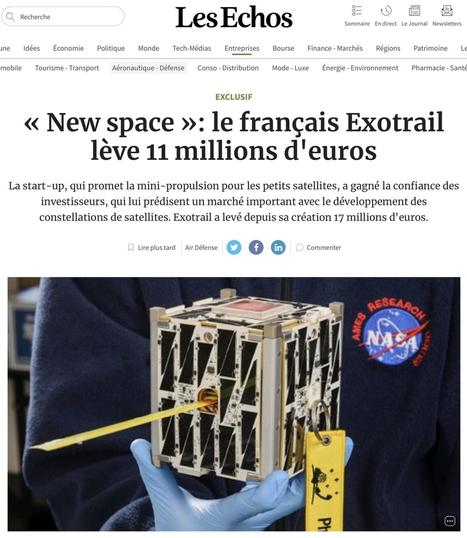

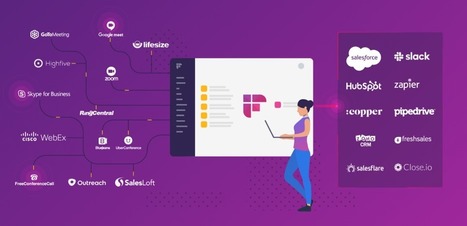





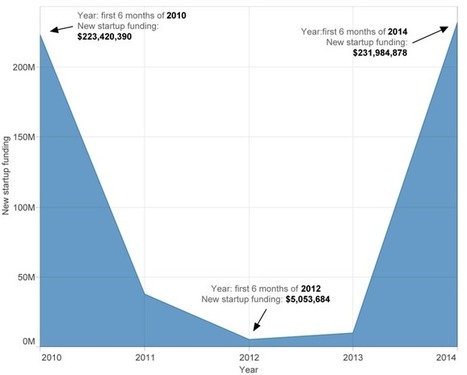


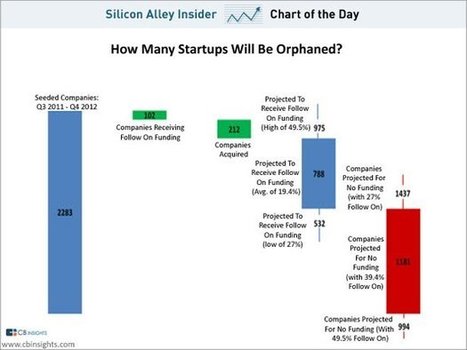
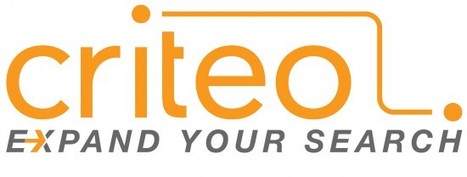
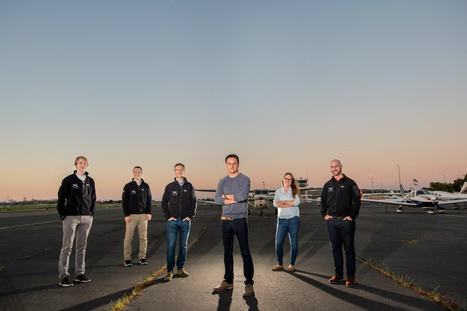















A l'heure où on gémit parfois de notre #souveraineté technologique et numérique perdues (ou bien s'agit-il d'innocence ?), réjouissons-nous de l'écosystème de formation, de recherche, et d'investissement mis en place en 2011 avec le Secretary general for investment, le Groupe Caisse des Dépôtset sa filiale Bpifrance, et qui porte ses fruits : la souveraineté est aussi une souveraineté de compétences ...